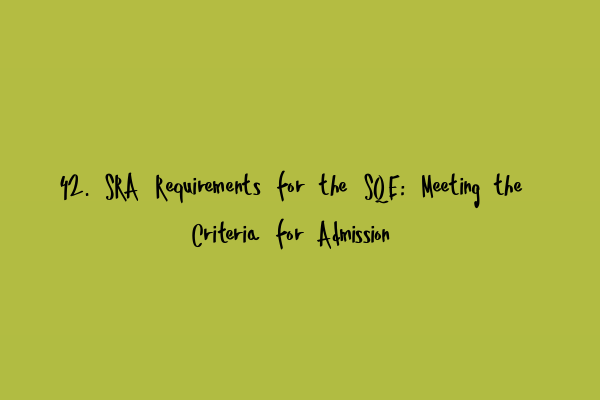42. SRA Requirements for the SQE: Meeting the Criteria for Admission
Are you considering a career in law and wondering how to qualify as a solicitor in the UK? The Solicitors Qualifying Examination (SQE) is a new assessment introduced by the Solicitors Regulation Authority (SRA) to ensure that all aspiring solicitors meet the required standards of competence. In this blog post, we will delve into the SRA requirements for the SQE and guide you on how to meet the criteria for admission.
The Key Aspects of the SQE Exam
The SQE is divided into two stages – SQE1 and SQE2. SQE1 assesses your functioning legal knowledge and consists of multiple-choice questions (MCQs) and written tasks. On the other hand, SQE2 tests your practical legal skills through various tasks, including oral presentations, written advocacy, legal research, and drafting. It’s important to note that both stages of the SQE must be passed to qualify as a solicitor.
Now that we understand the structure of the SQE exam, let’s explore the content and scoring criteria in more detail.
SQE1 Content and Scoring
When it comes to SQE1, the exam covers seven areas of law:
- Business Law and Practice
- Dispute Resolution
- Contract Law
- Criminal Law and Practice
- Property Practice
- Tort Law
- Wills and Administrations, and Solicitors’ Accounts
Each area of law is weighted differently in the exam, with Business Law and Practice having the highest weightage. Therefore, it’s crucial to have a solid understanding of all these areas to perform well in SQE1.
The scoring of SQE1 is based on a percentile ranking system, meaning your performance will be compared to that of other candidates. It is important to aim for a high score to improve your chances of success and stand out among your peers.
To enhance your preparation for SQE1, we recommend practicing SQE case studies to apply your knowledge in real-life scenarios. You can find more information on this topic in our article “SQE Case Studies: Applying Knowledge in Real-Life Scenarios“.
SQE2 Content and Scoring
SQE2 focuses on testing your practical legal skills. The tasks in SQE2 are designed to assess your ability to apply legal principles in real-world situations. Some of the key skills tested in SQE2 include advocacy, client interviewing, legal research, and legal writing.
Similar to SQE1, SQE2 is also scored using a percentile ranking system. It is crucial to demonstrate excellent practical skills to stand out and meet the criteria for admission. To improve your time management skills and maximize your efficiency during the exam, we recommend reading our article “Mastering Time Management in SQE: Strategies for Efficient Exam Completion“.
Tips to Meet the SRA Requirements for the SQE
Preparing for the SQE requires a comprehensive study plan and a focused approach. Here are a few tips to help you meet the SRA requirements for the SQE:
- Start Early: Begin your preparation well in advance to allow yourself enough time to cover all the required material.
- Understand the Exam Format: Familiarize yourself with the structure, content, and scoring criteria of the SQE exam to know what to expect.
- Create a Study Plan: Develop a study plan that covers all the relevant areas of law and focuses on both theoretical and practical aspects.
- Practice Mock Exams: Mock exams are an excellent way to assess your progress and identify areas that need improvement. After taking a mock exam, analyze your results to identify your strengths and weaknesses. For more information on analyzing mock results for SQE, read our article “Analyzing Mock Results for SQE: Identifying Areas of Improvement“.
- Use Available Resources: Take advantage of SQE training materials, online resources, and study support provided by reputable providers to supplement your learning.
- Revise and Review: Regularly revise and review the material to reinforce your understanding and ensure you retain the information.
Finally, it’s essential to master effective revision techniques to enhance your chances of success. For detailed strategies and tips on effective revision, refer to our article “Mastering Effective Revision Techniques for SQE Success“.
By following these tips and putting in dedicated effort, you can meet the SRA requirements for the SQE and achieve your goal of becoming a qualified solicitor.
Remember, success in the SQE requires a balanced approach and efficient utilization of your time. Don’t forget to pay attention to the MCQs in SQE1, and for insights on conquering MCQs, check out our article “Conquer the Multiple Choice Questions (MCQ) in SQE1“.
Good luck with your preparation!
